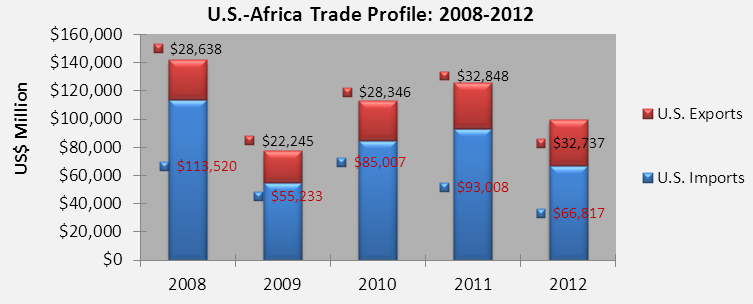Davies’ visit to the US is against the backdrop of a number of equally significant bilateral and multilateral economic summits and forums. Recently, relations between the US and Africa were brought to the fore by President Barack Obama’s visit to the continent this past June (26 June – 3 July). During his visit, Obama held discussions on numerous issues pertaining to US – Africa relations and declared his administration’s ardent support for the extension of AGOA. These discussions on economic linkages continued at the AGOA Forum hosted by Ethiopia from 10 to 13 August 2013. Coincidently, both these event took place on the African continent this year, as did the 5th BRICS Summit, which was hosted in Durban at the end of March. The US’s economic resurgence, albeit moderate, is a timely reminder of the cyclical nature of economic growth and contractions. Furthermore, it crystallizes the importance of the diversification of trade partners for African economies.
The South African Trade and Industry Minister’s visit to the US is not only to impress upon relevant stakeholders the mutual commercial and political benefits AGOA provides both parties, but is also to specifically advocate for South Africa continued inclusion in the Act. In recent years, there has been a small but vocal lobby group that has been arguing that South Africa, as a middle income country, should be graduated out of AGOA when the Act expires in September 2015. AGOA is a US unilateral trade preference scheme that aims to further liberalise trade between the US and sub-Saharan African economies through providing duty and quote free market access to the US market. To date, 37 sub-Saharan African countries are eligible to export their products under the 13 year old Act.
Some criticise the Act in its entirety, claiming it has been ineffective in delivering on its economic and political objectives; liberalizing African economies and politically aligning the two regions. Critics point to the recent tapering of trade growth between the US and Africa while highlighting the exponential growth of trade and investment between African economies and BRICS countries, more specifically with China and India.
At first glance, trade and, to a lesser extent, foreign direct investment statistics affirm the position of AGOA critics. China’s (the dominant BRICS economy) trade with Africa in 2012 was approximately 2 trillion rand ($200 billion USD) while US – Africa trade in the same period was valued at nearly 1 trillion rand ($100 billion USD). However, (energy related products excluded) one finds that Africa has a more diverse trade relationship with the US than with China. While the quantities are relatively small; manufactured, agricultural, textiles and apparel, chemicals, and iron ore products are a few of the diverse products Africa exports to the US market under AGOA and the generalised system of preferences. Whereas, African trade with China is still characterised by exports of African resources and imports of Chinese manufactured goods. Recognizing this imbalance, China has vowed to diversify its imports from African economies but it remains to be seen as to how this will be achieved.

African economies are gradually industrializing and the largest consumer market in the world will become vital for their products. AGOA and the GSP provide duty and quota free access to the US for approximately 6,800 African products. Currently, only a fraction of the allocated tariff lines are being utilised. This reality is at the nexus of AGOA and BRICS linkages. The new wave of capital inflows from BRICS economies, as well as other emerging markets, into Africa’s productive sectors may be channelled for both domestic consumption and export growth. AGOA provides an additional incentive for these capital inflows to be invested in industries producing for the US market.
The US stands to gain significantly from economically richer African economies. Africa has a growing middle class, (a young one at that) which is prime for US products and services. US firms number over 600 just in South Africa alone, an illustration of the growing importance of the region. Africa is the 2nd fastest growing region in the world and is projected to be the fastest within the next decade, the current US administration indicated through the National Export Initiative that it looks to double its export globally by 2014; therefore, AGOA should be viewed as a strategic policy that will act as a centrepiece to achieving this end. Concurrently, African economies must take full advantage of the opportunities offered by AGOA. The US has a number of agencies and programmes that assist non-US companies doing business with US companies, which should be utilized.
As Minister Davies goes into bat for African economies in Washington, it is vital that South Africans be fully engaged with the AGOA renewal process as its outcome will ultimately impact their economic welfare. To facilitate such engagement, the South African Institute of International Affairs (SAIIA) along with TIPS, will continue to convene AGOA dialogues to update interested parties on the renewal process.
It is crucial we bear in mind that the number of summits and forums that have recently occurred are not mutually exclusive, but are separate pieces sown with a common thread. That thread is diversity, and diversity brings strength. Africa’s economic development will be further boosted by treating the US and BRICS commercial relationships with a view to exploring the complementarities that exist.
Related Resources
- Download the dti presentation from the recent AGOA event hosted by SAIIA and TIPS: South Africa’s Key Messages on the Future of AGOA , by Brendan Vickers
- Download a presentation from the recent AGOA event hosted by SAIIA and TIPS: The Impact of Africa Growth and Opportunity Act (AGOA) on the South African Automotive Sector , by Evans Chinembiri.
- Read an article in Engineering News, Davies in US to lead push for SA’s continued Agoa inclusion






